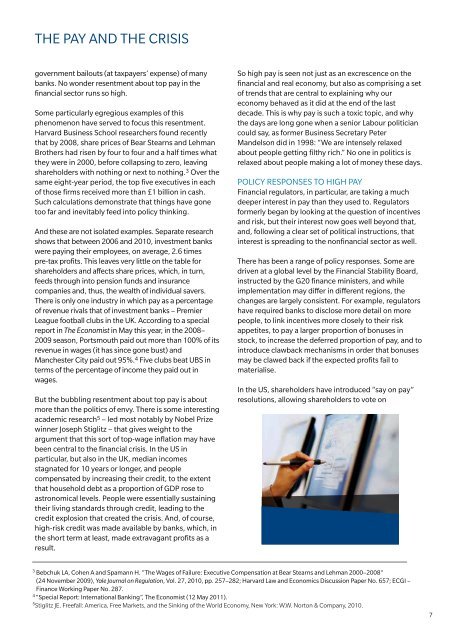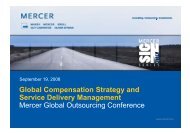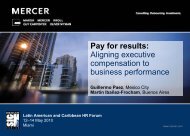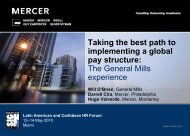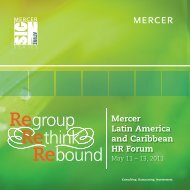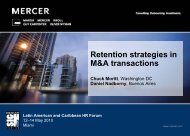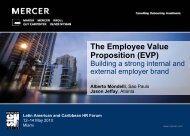A SERIES OF ARTICLES FRoM THE 2011 EMEA CoMPENSATIoN ...
A SERIES OF ARTICLES FRoM THE 2011 EMEA CoMPENSATIoN ...
A SERIES OF ARTICLES FRoM THE 2011 EMEA CoMPENSATIoN ...
Create successful ePaper yourself
Turn your PDF publications into a flip-book with our unique Google optimized e-Paper software.
<strong>THE</strong> PAY AND <strong>THE</strong> CRISIS<br />
government bailouts (at taxpayers’ expense) of many<br />
banks. No wonder resentment about top pay in the<br />
financial sector runs so high.<br />
Some particularly egregious examples of this<br />
phenomenon have served to focus this resentment.<br />
Harvard Business School researchers found recently<br />
that by 2008, share prices of Bear Stearns and Lehman<br />
Brothers had risen by four to four and a half times what<br />
they were in 2000, before collapsing to zero, leaving<br />
shareholders with nothing or next to nothing. 3 Over the<br />
same eight-year period, the top five executives in each<br />
of those firms received more than £1 billion in cash.<br />
Such calculations demonstrate that things have gone<br />
too far and inevitably feed into policy thinking.<br />
And these are not isolated examples. Separate research<br />
shows that between 2006 and 2010, investment banks<br />
were paying their employees, on average, 2.6 times<br />
pre-tax profits. This leaves very little on the table for<br />
shareholders and affects share prices, which, in turn,<br />
feeds through into pension funds and insurance<br />
companies and, thus, the wealth of individual savers.<br />
There is only one industry in which pay as a percentage<br />
of revenue rivals that of investment banks – Premier<br />
League football clubs in the UK. According to a special<br />
report in The Economist in May this year, in the 2008–<br />
2009 season, Portsmouth paid out more than 100% of its<br />
revenue in wages (it has since gone bust) and<br />
Manchester City paid out 95%. 4 Five clubs beat UBS in<br />
terms of the percentage of income they paid out in<br />
wages.<br />
But the bubbling resentment about top pay is about<br />
more than the politics of envy. There is some interesting<br />
academic research 5 – led most notably by Nobel Prize<br />
winner Joseph Stiglitz – that gives weight to the<br />
argument that this sort of top-wage inflation may have<br />
been central to the financial crisis. In the US in<br />
particular, but also in the UK, median incomes<br />
stagnated for 10 years or longer, and people<br />
compensated by increasing their credit, to the extent<br />
that household debt as a proportion of GDP rose to<br />
astronomical levels. People were essentially sustaining<br />
their living standards through credit, leading to the<br />
credit explosion that created the crisis. And, of course,<br />
high-risk credit was made available by banks, which, in<br />
the short term at least, made extravagant profits as a<br />
result.<br />
So high pay is seen not just as an excrescence on the<br />
financial and real economy, but also as comprising a set<br />
of trends that are central to explaining why our<br />
economy behaved as it did at the end of the last<br />
decade. This is why pay is such a toxic topic, and why<br />
the days are long gone when a senior Labour politician<br />
could say, as former Business Secretary Peter<br />
Mandelson did in 1998: “We are intensely relaxed<br />
about people getting filthy rich.” No one in politics is<br />
relaxed about people making a lot of money these days.<br />
POLICY RESPONSES TO HIGH PAY<br />
Financial regulators, in particular, are taking a much<br />
deeper interest in pay than they used to. Regulators<br />
formerly began by looking at the question of incentives<br />
and risk, but their interest now goes well beyond that,<br />
and, following a clear set of political instructions, that<br />
interest is spreading to the nonfinancial sector as well.<br />
There has been a range of policy responses. Some are<br />
driven at a global level by the Financial Stability Board,<br />
instructed by the G20 finance ministers, and while<br />
implementation may differ in different regions, the<br />
changes are largely consistent. For example, regulators<br />
have required banks to disclose more detail on more<br />
people, to link incentives more closely to their risk<br />
appetites, to pay a larger proportion of bonuses in<br />
stock, to increase the deferred proportion of pay, and to<br />
introduce clawback mechanisms in order that bonuses<br />
may be clawed back if the expected profits fail to<br />
materialise.<br />
In the US, shareholders have introduced “say on pay”<br />
resolutions, allowing shareholders to vote on<br />
3<br />
Bebchuk LA, Cohen A and Spamann H. “The Wages of Failure: Executive Compensation at Bear Stearns and Lehman 2000–2008”<br />
(24 November 2009), Yale Journal on Regulation, Vol. 27, 2010, pp. 257–282; Harvard Law and Economics Discussion Paper No. 657; ECGI –<br />
Finance Working Paper No. 287.<br />
4<br />
“Special Report: International Banking”, The Economist (12 May <strong>2011</strong>).<br />
5 Stiglitz JE. Freefall: America, Free Markets, and the Sinking of the World Economy, New York: W.W. Norton & Company, 2010.<br />
7


